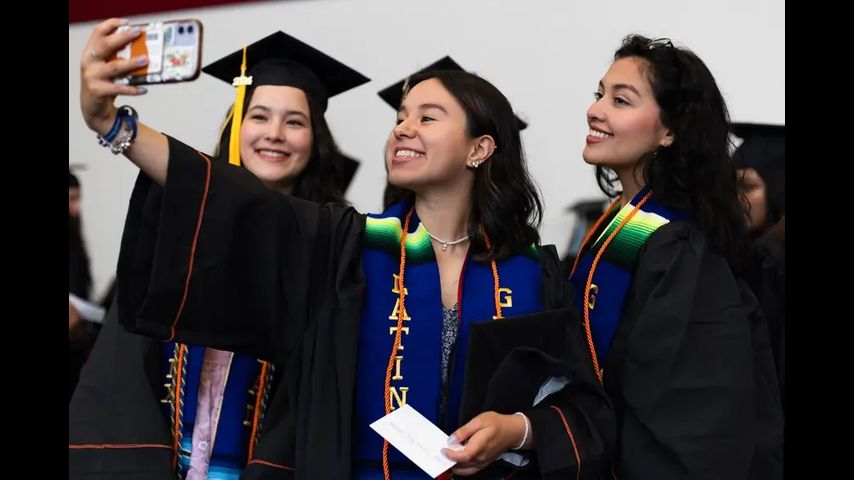
Via Canva
Editor’s Note: Henders is a high school student from Texas. He previously co-wrote an opinion piece for The Latino Newsletter.
To some, Diversity, Equity, and Inclusion (DEI) is a corporate buzzword or a liberal PR stunt. To others, it’s an unfair advantage for “unqualified” people from underrepresented communities.
But for a first-generation Latino living in Texas like me, DEI was never just an acronym. It was an opportunity to succeed in a system that was never designed for students from communities historically shut out of education. In recent months, Republican lawmakers have targeted DEI programs in schools, colleges, and public institutions across the country. In their crusade against a “woke” culture, Trump Republicans have erased scholarships, dismantled mentorship initiatives, and silenced support systems that helped students like me survive and succeed.
In 2023, the Supreme Court decision outlawed race-conscious admissions nationwide. State institutions like the University of Texas at Austin (UT Austin) and private universities had used race in admissions, and now they must rely on so-called “race-neutral” methods to admit Latino students.
It’s Happened Before
We have seen this scenario before, and we know it doesn’t work.
After California banned affirmative action through Prop 209, Latino enrollment in top universities plummeted. Economists and education advocates are already warning that without intentional outreach and targeted aid, college-going gaps between white and Latino students will only grow. Instead of acting on those warnings, though, Republican lawmakers doubled down in Texas. Senate Bill 17, the state’s DEI ban, forced UT Austin to shut down its Monarch Program —a vital initiative for undocumented and first-generation Latino students— and close down its multicultural centers.
If colleges are now forced to rely more heavily on test scores without affirmative action, it’s important to understand their negative impacts. For over 2.1 million of the 2020 high school graduates, the average math SAT score was 547 for white students and 632 for Asian students. In contrast, Hispanic/Latino students averaged 478, and Black students just 454. Only about one-quarter of Black test-takers met the SAT college-readiness benchmark in math, compared to nearly 60% of white students. And at the top end, the gap worsens: 88% of students scoring above 700 in SAT math were either white or Asian, while just 6% were Hispanic, and only 1% were Black.
These aren’t minor gaps, but a structural reflection of inequality baked into every level of our education system, reinforcing a system where privilege is mistaken for merit.
Across the education system, DEI offices have also provided vital support for cultural clubs and graduation ceremonies that affirm students’ identities. But Texas’ proposed K–12 DEI ban (Senate Bill 12) would prohibit any school program referencing race, ethnicity, or gender, even requiring parental opt-ins for clubs. That means Latinx student groups, LGBTQ+ alliances, and similar safe spaces could disappear altogether.
At the college level, the effects are already visible: UT Austin’s DEI ban forced the university to pull funding from its Latinx graduation ceremony in 2024. Students ended up fundraising themselves just to keep the event alive, including bilingual speeches so that Spanish-speaking families could understand and be part of the celebration.
One student organizer, Liany Serrano Oviedo, said speaking Spanish at the ceremony was “100%” necessary so her mom could follow along. Cutting support for these kinds of events sends a clear message to Latino students that their presence and culture are optional at best, unwelcome at worst.
Fairness No Longer the Goal
Right now, anything seen as “divisive” is at risk. Add to that the chilling effect of anti-critical-race-theory laws and a Texas 2021 bill that led some districts to sideline Hispanic history entirely, and you’re left with schools that are scared to acknowledge Latino students’ realities. Even bilingual education, which Texas still officially supports, is threatened by rising suspicion toward anything race-related. All of this creates a hostile atmosphere where being Latino in school feels like something you’re expected to keep quiet about.
The anti-DEI movement goes beyond political talking points. It is a personal attack against students like me. When lawmakers ban DEI, fairness is no longer the goal. It is all about preserving privilege. Programs that helped us find community, mentorship, and belonging are disappearing every day.
I didn’t need special treatment. I just needed a chance. DEI gave me that.
Taking it away won’t level the playing field. It will just ensure fewer of us Latinos get to play.
Still, I will be clear: I am proud to be Latino. I am proud of my culture, my language, and the community that raised me. And I will not be silenced by political agendas or social media campaigns that try to paint our presence as a threat.
About the Author
Henders Aponte is a high school student passionate about politics and journalism. He writes about culture, politics, immigration, and education.
And now a word from our sponsor.
The portfolio that's automatically up to date with your work.
Authory saves you hours with a portfolio that's always up to date.
Get backups of all your articles.
Be ready to impress potential clients and employers, anytime.
What We’re Reading
Cuban Exiles and Trump: From the Associated Press, “Among those facing deportation is a pro-Trump Cuban rapper behind a hit song ‘Patria y Vida’ —‘Homeland and Life’— that became the unofficial anthem of anti-communist protests on the island in 2021 and drew praise from the likes of then Republican Sen. Marco Rubio, now Secretary of State. Eliéxer Márquez, who raps under the name El Funky, said he received notice this month that he had 30 days to leave the U.S.”
The Latino Newsletter welcomes opinion pieces in English and/or Spanish from community voices. Submission guidelines are here. The views expressed by outside opinion contributors do not necessarily reflect the editorial views of this outlet or its employees.




